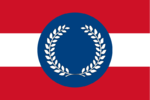Republic of Freedonia
Republic of Freedonia | |
|---|---|
| Motto: '''Liberty, Equality, Fraternity | |
| Anthem: Hail Columbia | |
| Capital and largest city | Libertaria |
| Official languages | None Official English (de facto) |
| Religion | None Official |
| Demonym(s) | Freedonian |
| Government | Unitary parliamentary constitutional republic |
| Legislature | Committee of Public Affairs |
| Establishment | October 9th, 2020 |
| Population | |
• Census | 18 (naturalized) |
| Currency | USD |
| Time zone | Eastern Standard Time |
The Republic of Freedonia is a unitary directorial semi direct constitutional republic that claims nationhood, but is seen as a micronation by foreign observers. It was founded on October 9, 2020 claiming territory along the East Coast of North America, primarily in the south of New York and Florida. The Republic takes heavy influence from the early American and French republics founded at the end of the 18th century, stressing the ideals of classical liberalism and harboring anti-monarchical sentiment. The Republic is headed by the Committee of Public Affairs. All committee members are co-equal and a decision must reach majority rule before it can become law. The CPA holds tremendous executive, legislative, and judiciary power. While criticized, some citizens have expressed the necessity of this decision by the provisional government while the Republic is in its infancy. Not wanting to fall to the civic problems that plagued the United States before the adoption of its current Constitution in 1789, a capable, but measured, central government is needed to run the new state.
Etymology
The term republic originates from the Latin term res publia meaning "a public matter". This phrase was commonly used by Roman writers to describe their government. During the Renaissance, the term was used to describe any government that was not a monarchy, even though certain writers theorized as to how such a system would function. However, in a modern context, it is meant to describe a liberal democracy, such as those set up throughout the Western world. The name "Freedonia" is a derivative of the word Freedom.
History
Origins
Months before the official founding of the Republic existed a predecessor state to Freedonia. This predecessor state was founded by a group of friends in mid-2020, collectively fed up with the current situation in the United States decided to secede from the United States and create a state in which the ideals of personal autonomy, inalienable rights, and anti-totalitarianism. While this group had varying political views from conservatives to anarchists, they were all in general agreement about these certain principles. The government of this nascent nation was a direct democracy where the citizenry sat on a collective council and had one vote on policy motions that were proposed. It was not fated to last, however, and the collective council dissolved later within the month. However, for one its members, it reignited a certain interest in the concept of a micronation and in micronationalism as a whole. Ariel Lederman had left the micronational community in the Summer of 2015 due to the utter failure of his nation to get off the ground as well, and primarily, for personal reasons. But, seeing that something similar to this concept could work, Lederman rejoined the micronational community and founded Freedonia later that year.
Founding of the Republic and organization of the Committee
Lederman founded the Republic of Freedonia on the 7th of October of the year 2020. The Republic was meant to be a return to the ideals of the early French Revolution and American Revolution, namely liberalism, with emphasis on the Lockean catechism: "Life, Liberty and Property".
However, the Republic faced an issue. There were simply not enough members to form a coherent, well-oiled, multi-branch government as is found in most democracies around the world. So, Lederman coalesced power in a directoral body taking inspiration from the French Directory. While Lederman did not like centralizing a lot of power in a government as it went again his libertarian principles, he thought it necessary as a temporary measure in order to pass legislation and create the backbone of the nascent country. The Committee functioned as an elective oligarchy that could execute, legislate, and judge the law of the land.

